By Belina Budini
Part Three
Memorie.al / A letter can turn your life around and this is what happened to Koço Tashko, the protagonist of Albanian communism in the early years, a Harvard graduate, then seduced by communist ideas and the sucker of one of the noble families of Korça at the time, the Tashkos. It is about a letter that Koço Tashko addressed to the Comintern (Communist International) but that never reached the Comintern. Destined to inform this organization that united and led all the communist parties of the world and that had its headquarters in Moscow, it ended up where it shouldn’t have. In the hands of Enver Hoxha and Miladin Popovic. Fatality.
Continued from the previous issue
Koço Tashko’s letter to the Comintern
– The National Liberation War and Relations with Nationalists –
The proclamations and tracts that came out after the formation of the Party were, for a long time, so long and heavy in subject matter that even the members of the Party themselves had difficulty reading them, and it has been established that many members did not read them. A large part, the first part of these publications, spoke about the international situation and the war of the Soviet Union.
I have no doubt that even though the Red Army is today the greatest popularizer of the Soviet Union; it still remains one of our main tasks to popularize the USSR, in its war and the international situation, with our own means. On the other hand, we must not forget that, as far as we are concerned, the sector of our war is here inside, in Albania.
The district committees published the Red Army communiqués daily, but for a very long time we did not say a word about the issues of our sector, neither in those communiqués nor in any special bulletin.
The friends of the Party had a thirst to sing something and to learn something about internal problems, but our publications on internal issues dealt with generalizations. We did not respond to the enemy’s propaganda about Kosovo, about religion, about the family, about private property and so on. The economic problems of the country were not studied and still remain unstudied. Our revolutionary and anti-imperialist history, which was essentially rural, we do not mention.
Not a word about Haxhi Qamili, known as the leader of the villagers who fought simultaneously for land against feudalism and against foreign intervention in Albania. The Durrës government, in which Mustafa Kruja participated and which was the first and almost exact edition of the current government. The
Congress of Lushnja, an example of the unification of national forces to prepare the war against the Italian occupier and the war that Mustafa Kruja waged against this Congress.
The War of Vlora as an edition of the armed war that we are preparing against the occupier today. The war of the youth, of the Bashkimi Society, its connection with the peasantry, its sympathy for the Soviet Union, the origin of the Party in its members. The war of the demonstrations of April 7, 1939 and the intrigues of Italy through its Albanian agents, to prepare the occupation of Albania and others.
As a result, the members of the Party and organized sympathizers became “specialists” of the international situation and ignorant of the situation and of the Albanian revolutionary history. Thus, the enemy’s accusation that we are agents of foreigners was able to find credence.
From August, when the German army had its provisional successes, the Party’s tracts and publications (except for the communiqué) came out without any mention of the foreign situation, i.e., they took on the character of a polemic full of objectives and invectives (remarks and accusations, editorial notes) against the government of Mustafa Kruja.
But the momentum of “leftism” that the Party members had taken from the general line of the Central Committee, continued (I do not agree with comrade Miladin that the errors of “leftism” stem from individuals in the membership, but I agree that no matter how many members there are who inherit “leftism” from groups of “cadre theories”, the Central Committee still bears responsibility, not only for not combating these “leftist” legacies, but also for feeding and encouraging “leftism” by means of the general line, as I have shown above and as I will show below.
The Central Committee encouraged the translation of songs of social revolutions in Russia, France and elsewhere. A good deed for the training of cadres and sympathizers, but harmful, because these cadres and sympathizers come to the villages of Albania (I only know the districts of Peza) and sing to the villagers, the poor and the agallar, the songs of the social revolution and not the National-Liberation and Anti-Fascist revolution.
The villagers of Peza, as a result of the songs and the method of our propaganda, have been quite clear on this point, that we are communists who fight for communism and not communists who guarantee and are the only ones who can guarantee the complete national liberation and happiness of the villagers.
So we should not be surprised why on September 29, when Peza was attacked by fascism, the villagers in the vast majority showed themselves to be followers of Shyqyri Peza (the compromiser), the rest of them were Myslim and none of them were from the Party.
On this occasion, I am also reminded of the phrase repeated daily by comrade Dushan: “national song, demonstration”. However, comrade Dushan must have understood by now that the opposite slogan to ridicule our method or tactics, before the formation of the Party in our mass movement, became: “Song of the Paris Commune”.
There are no people in the actions and demonstrations of the Albanian Communist Party. On the other hand, I must mention that in recent times the comrades have begun to give national liberation words to the melodies of Russian, French songs, etc.
The attitude of the Central Committee towards Myslim Peza has been negative from the beginning. I remember that it was formulated by comrade Miladin like this: “We need our partisan detachments; we cannot waste time and material on a criminal”. Unfortunately, you cannot find a courageous nationalist who has not committed crimes. Even the best ones are the sons of the feudal system that Albania has had and still has.
But only a sectarian can forget the national-liberation importance of 20-30 villages in the Peza district, where Myslim had great influence. These villages are located in the strategic heart of Albania, in the Tirana-Durrës-Elbasan triangle, they command the main roads (arteries) of fascism, and they are 4-6 hours away on foot from the capital.
This region faced fascism (without the help of the communists, only with villagers and escaped soldiers and criminals) in July 1941 and until the end of February 1942, Myslim’s group remained illegal in the hills of Peza and fascism did not dare to pursue it. Communists and escaped soldiers gathered there.
Having no Albanian militia to suppress Myslim’s group, the Italians offered a compromise, which Myslim’s brother, Shyqyriu, accepted in February 1942. The compromise was that Shyqyriu would maintain peace in Peza and, in exchange, the government would not have the right to maintain armed forces, police and gendarmerie, in Peza.
In the Peza region, therefore, a kind of republic was formed in the heart of fascism. Myslim did not accept the compromise, but benefited from autonomy. He accepted the connections with the Albanian Communist Party on the basis of the Albanian faith; he accepted almost everything that the Party proposed to him.
Comrades, equipment, sheltering the chetas, feeding them, making connections, for their further passage and escorting them with his people, escorting comrades, sheltering national liberation conferences, sheltering the Central Committee, creating a weapons and ammunition depot (this was done with money not belonging to the Party), sheltering comrades sent for action or returning from action.
Myslim also carried out some actions with his people united with our comrades. But comrade Miladin was not satisfied with this, because Myslim’s actions were indeed very few, but no less than the actions of the partisan detachments, before August 1942. Myslim did not refuse to increase the actions, but insisted only on these points:
So that he would not be the only one carrying out actions, so that Peza would not bear the entire burden of the fascist reaction, that the actions be carried out a little far from his region, so that they would not be directly blamed on him, and he requested this because he felt that the villagers were not ready to face the consequences and that, as we said above, the actions in Albania had not yet taken on a wide character.
I am convinced that with a lively interest of the Party, Myslim would have done much more, i.e. the influence of the party on him would triumph, against the influence of his brother, Shyqyri. However, the party was content with the 300 napoleons it gave to Myslym, for the food of 20-30 illegal friends and sympathizers, who had been there for 8 months, help that was given because it was persistently requested.
Until mid-May, the Central Committee was not even interested in the Peza cell. Until then, this cell received contradictory orders from the Central Committee and the Regional Committee, apart from the orders and directives of respected communist individuals, who came there when they needed it or, in passing.
In May, the Central Committee became interested in this group, but even this by chance, on the occasion that illegal members of the Central Committee, the Regional Committee and others who had been there for shelter, during the days of the betrayal of the provocateur Ludovik, gathered there.
With the seizure of documents and tracts proving that a Party conference with the nationalists was held in Peza, fascism fell to Peza. It gathered 6,000 Italian militia and soldiers to fall to Peza. It used tanks, cannons and 14 bomber and machine gun planes. The withdrawal of the detachment was carried out by chance without major losses (1 comrade and a villager killed), the enemy’s losses in people were just as many.
Great terror in the villages: burning, looting, murder, dishonor. Myslim is now in the mountains illegally, with a small detachment. No villagers followed him, a good part sympathizes with him, and the majority is with Shyqyri, from whom they hope for a new compromise (Shyqyri is being kept in trust by the prefect of Tirana). I cannot make prophecies, but now it seems to me that Myslim in Peza has not been more valuable than Myslim in the mountains.
A wave of terror has begun again in Tirana; fascism believes that this time there will be no place for communist cadres to hide outside Tirana, nor inside Tirana, because the people are no longer supporting the communists. These days in Tirana, four comrades were lost, some of the best.
Comrade Miladin refused to understand not only the national-liberation importance of Myslim, but also of other Albanian personalities who were victims of fascism. In March, I was in Korça and there I learned that Mustafa Kruja shot Muharrem Bajraktari and Bazi i Canit. After a short war, fascism celebrated a great victory.
Two weeks later, when I returned to Tirana, I asked comrades of the Central Committee what position the party took towards these victims of fascism, victims of first-rate importance among the population of Kruja, Mati and the northeastern Highlands. The party had not taken any position, as a comrade of the Central Youth Committee and the Central Committee of the Party told me (the most active, at the same time the most sectarian comrade, on whom comrade Miladin was based (this is Qemal Stafa, editor’s note), we do not need these nationalists, because tomorrow they will be our enemies.”
I insisted that the Central Committee should immediately, flame by flame, issue a tract in their favor as a sign of solidarity and to offer them help in person; I insisted that the tract be issued now, no matter how late. The tract was issued after a month and a half (May) and after censorship by the Central Committee comrade I mentioned above, who wanted to remove the names of Bazi i Can and Muharrem Bajraktar from the tract.
While our attitude has been passive, the attitude of the “orthodox” Sehirxhiu towards those nationalists who are fought by fascism with weapons in open battle, the attitude towards the nationalist elements who are imprisoned and interned has been even more negative. Only once was a kind word said (May 1942) for one of these nationalists, for Mehdi Frashëri, whom fascism had interned in Italy and through the press said that it had sent him to Italy on a mission.
This kind word for Mehdi Frashëri was said in the communiqué of the Tirana District Committee, only because Mustafa Gjinishi persistently requested it, that is, as a concession. Every departure from sectarianism was made as a concession to me or someone else, that is, as a result of my criticisms, criticisms that comrade Miladin interpreted as made with the aim of entering the Central Committee. / Memorie.al




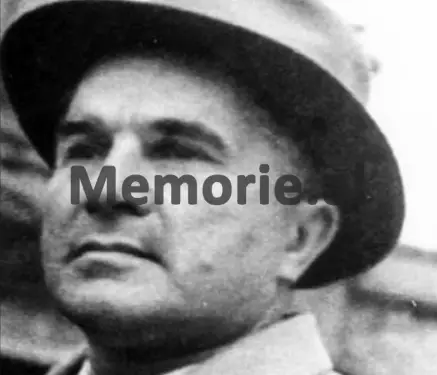
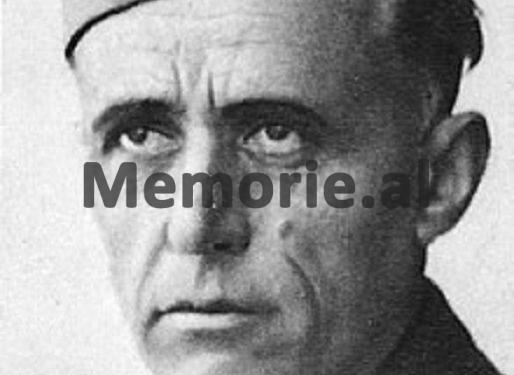
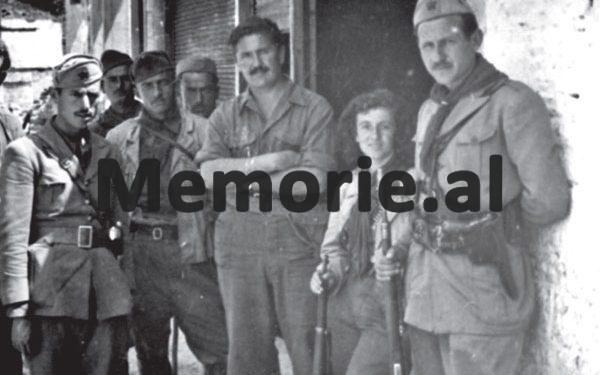
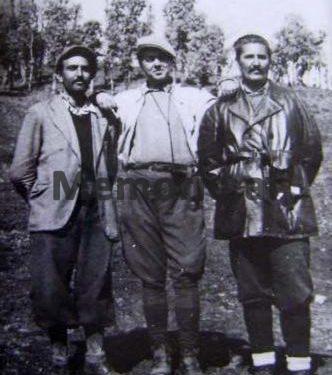
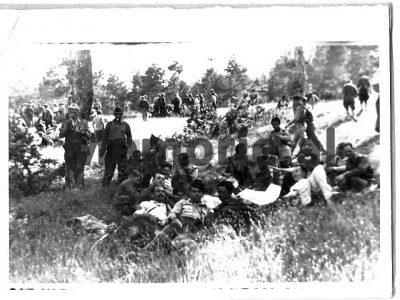
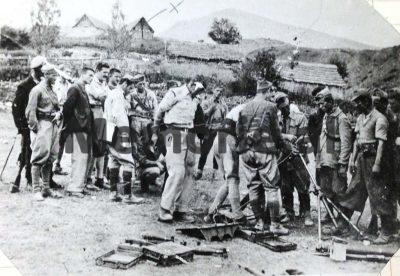
![“The ensemble, led by saxophonist M. Murthi, violinist M. Tare, [with] S. Reka on accordion and piano, [and] saxophonist S. Selmani, were…”/ The unknown history of the “Dajti” orchestra during the communist regime.](https://memorie.al/wp-content/uploads/2026/02/admin-ajax-3-350x250.jpg)
![“In an attempt to rescue one another, 10 workers were poisoned, but besides the brigadier, [another] 6 also died…”/ The secret document of June 11, 1979, is revealed, regarding the deaths of 6 employees at the Metallurgy Plant.](https://memorie.al/wp-content/uploads/2026/02/maxresdefault-350x250.jpg)




